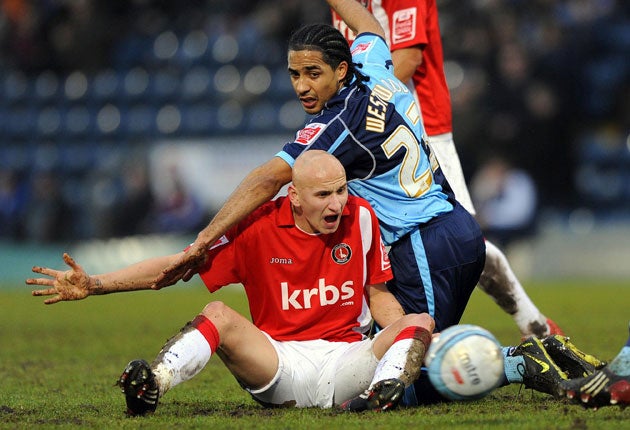Murray fury as Charlton count cost of relegation

Richard Murray, Charlton Athletic's chairman, has a proposal that he claims would solve football's financial woes overnight: "If every player took a 10 per cent wage drop, football would be sorted out. Would it make any difference to John Terry? Or even players at our level, if, instead of three grand a week they were on £2,700? Would they say they'd go on the dole instead of playing football?"
Probably not a plan worth putting to Gordon Taylor and the Professional Footballers' Association; rather, it is the pained cry of a man who was never happy with the sport's financial structure even when his own club were enjoying some of the fruits of it and is even more disenchanted now that Charlton are enduring the bitter taste of life in League One.
Hartlepool were the last visitors to The Valley; Leyton Orient are the next ones, tomorrow night, which is at least a local derby and a televised one. The fee from Sky will be a princely £30,000, following a neat mathematical progression that Murray uses as a rule of thumb for television income in each division: "I think of it as roughly £30m [annually] in the Premier, £3m in the Championship and £300k in Division One. You just keep knocking noughts off and boy is that a difference."
Like several of their rivals for promotion this season, including Leeds, Norwich and Southampton, Charlton have felt that difference after suffering not one but two relegations in quick succession. It used to be that clubs falling out of the Premier League, with up to £25m of parachute payments over two years to break the fall, were immediately tipped to go straight back; nowadays if they do not manage it, they seem to go to the other extreme, as Charlton did last May. "The majority of clubs that have come out of the Premier have gone into administration," Murray says. "Others have avoided it in the nick of time. Look at a club like Middlesbrough, which I always thought was pretty well run. They're in as big trouble as anyone else."
What appears to happen is that becoming established in the Premier League over a number of years – Charlton had eight – incurs such huge ongoing costs that, as clubs like West Ham, Bolton and Portsmouth could discover this season, one bad campaign ending in relegation leaves them exposed to the sudden gulf in income.
"One of the sad things when you go down is that all your income goes down, but some of your costs stay the same," Murray says. Wages are the most obvious example, which means many high-earners have to be sold, reducing the chances of playing success, but there are others: "Take things like rates and stewarding. They don't care what division you're in. Instead of seeing that we're getting smaller crowds [and] halving the stewarding bill, local councils won't do it, because their backsides are at risk in our compensation culture. So really, a club like us, with a stadium like us, have to have Championship football to be viable."
The chances of that happening are good, though far from guaranteed. Charlton have been in the top three for much of the season and could face an exciting end to it, with Leeds and Norwich as their last two home fixtures. By reaching this stage of the season with only two League defeats, they have already set a club record under Phil Parkinson, who seemed an unlikely choice as manager last January, when his stint as caretaker following Alan Pardew's departure yielded three points from eight games.
Parkinson accepts that he needed to win over supporters but believes they have responded to a thorough overhaul of the squad with an emphasis on character and work ethic. "It's been a big turnaround but, in a way, that's what was needed," he says. "We're recreating what Charlton was all about, hard-working players wearing the shirt with pride."
Paolo Di Canio, Jimmy Floyd Hasselbaink and the rest are long gone and now The Valley sings in praise of Nicky Bailey, a captain with 10 goals from midfield, and the precocious England Under-18 international Jonjo Shelvey. Offers for both were resisted last summer, although Murray warns: "We had a £9m shortfall this year, which was found by directors loaning £7m and our banks supporting us by £2m. That's put us under no pressure to sell in January but we're budgeting that we're going to go up and there will be sales if we don't."
In the meantime, League One has its consolations, like winning matches and the wages too: "I prefer to deal with someone on £3,000 a week asking for an extra £100 appearance money than someone on £30k a week, because you just can't relate to it. It doesn't mean I want to stay in this division but at least you're dealing with sensible people."
Join our commenting forum
Join thought-provoking conversations, follow other Independent readers and see their replies
0Comments